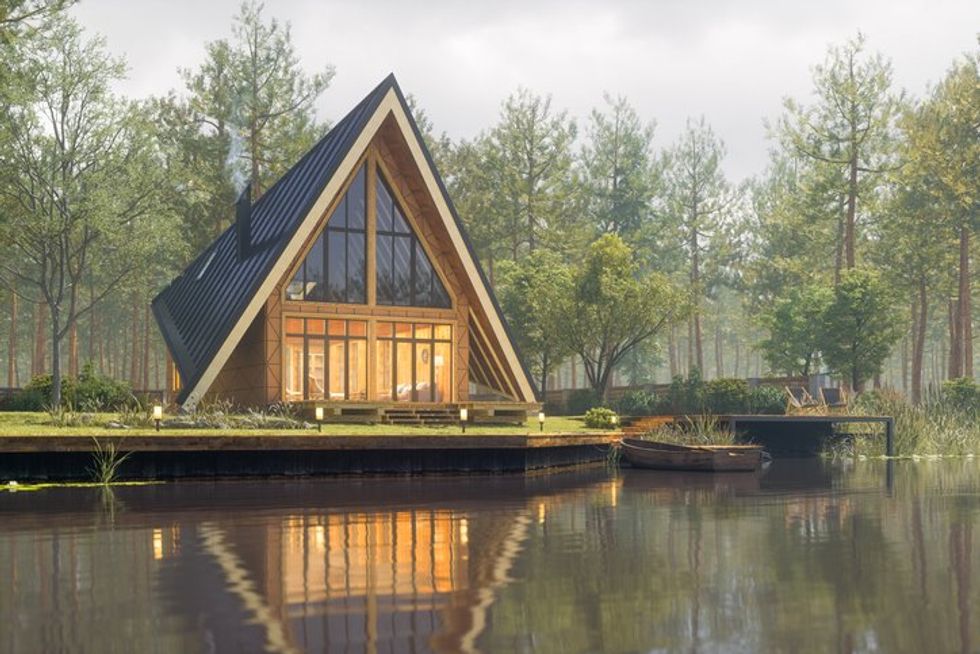
kali9/Getty

Zillowing your way to happiness.
In bed, you drag the slider down until your phone's brightness is at its lowest. You type z-i-l-o-w in the search box, too lazy to correct yourself. Google knows; it says, Do you mean Zillow? and there it is, the familiar website, its logo a home with a Z cutting across it, like a signature, like a haphazard check mark. Hovering over its search box is its motto, a command: Find it. Tour it. Own it.
You type your town and press enter too soon; the first search yields results in Florida, not Vermont. You type it again, add VT this time, and press enter. You move through the filters quickly: For sale, 2+ bd, 2+ ba, Houses. When you sort them, you sort by Newest. You see familiar cover pictures, know which ones you've scrolled through already. There's one at the top that's only been active for a few days, and it catches your eye, not because of the picture, but because of its price, which is close to $1 million. Hm. Your town is a town that's not known for million-dollar homes – no, leave that to the tourist hubs, to Burlington, Stowe, Woodstock. But here? Naturally, you're curious. You want to see this house and how these million-dollar sellers live.
In the world of window-shopping, especially for houses, you're selective; your taste changes as soon as you click.
So you click. You scroll through the pictures languidly, letting your eyes adjust to each one. A clear bowl of red apples sits next to one of two sinks in the kitchen. In the dining room, a blue paddle overlooks the table. In the living room, large, curtainless windows make way for a view of the back yard, the lawn so green and the sky so bright that you squint. You shrug; the house is nice. But it also seems to be in the middle of an identity crisis: a picture of the lower floor, its dark wooden staircase, and its wall adorned with antique portraits remind you of the property's early-1900s construction date. They clash with pictures close to the end of the listing of the new steel balcony railing and of the office, filled with sharp and shiny edges.
They want to sell this for $1 million? Good for them. But you've lost interest. Your thumb swipes back to the main page. You type the next town's name, then the next, then the next. Soon, you've gone through the entire county, and none of the houses are – how would you say it, just right? In the world of window-shopping, especially for houses, you're selective; your taste changes as soon as you click.
For example, when you scroll through listings, you look past houses that say New Construction. You want something with history; you emphasize this word even in your head; you want it to be lived in and have the markings of a home that was loved for a long time before the new owner came along. But when you look at older houses, you swipe past pictures that might hold these memories and swipe instead toward the kitchen, the laundry room, and the bathrooms, where you take an inventory of the older appliances and the outdated fixtures. You begin renovating it, removing this and that, before shrugging it off and clicking on a different house again. You're impatient; you swipe with a frenzy. Too spacious, too crowded, too colorful, not colorful enough, too bare, too furnished. You move through the houses with rejection already on your mind.
You drag the map from one side of the screen to the other. Click to see all homes, a text box says, and sometimes you do, all of the red dots coming alive, the ones you've already looked at a lighter shade as if faded from frequent use. Sometimes, you draw a boundary, choosing locations at random, zooming in, and drawing uneven circles: here, by the lake; here, around the islands; here, close to the border. Sooner or later, you return to typing, returning to familiar places grouped neatly together: Montpelier, Barre, Northfield. As you get closer to your husband's hometown, the search becomes more intimate; you look at houses you've probably driven past, houses his friends probably grew up in, and think about how far each one might be from his parents.
You think of his childhood, of the memories he tells you: This is where we had that car accident, and I had to run to football practice. This is where my friend's car got stuck, and we had to walk a few miles to the nearest house. This is where he and his friends would drive around as teenagers, speeding along the back roads, where their siblings and their parents still live now, so everywhere you look, you find someone who has a story of him when he was younger, someone who laughs and says, Did he tell you about this? You become nostalgic, even though you're not from here.

So instead of looking through more listings or typing, say, Woodstock or Rutland, you type San Jose, California. The map moves west, and there it is: home. You look at the cluster of bright red dots overlapping each other, reminding you of heat, of suffocation. You zoom in until you see East San Jose and the prices: $1.46M, $1.22M, $1.85M. There's Tully, Holly Oaks, Quimby. You trace the route from your middle school to your aunt's house, the house you and your parents lived in before you moved north, and you look at the large, red $1.50M marker at the corner of the neighborhood: a four-bedroom, three-bathroom, two-level house whose price decreased by $99,000 only a few weeks ago. Across the street is your cousin's house, where another marker boasts a $1.40M list price: another two-level with five bedrooms and three bathrooms, some fixtures updated and others remnants of 1988, its construction date. You realize that you've kept the same filters from the earlier search – of course, why not? This search came out of nowhere. So you reduce the numbers, putting, instead, For sale, 2+ bd, 1.5+ ba. You start sorting the results by Price (Low to High).
Gone is the particularity with which you looked through the houses in Vermont, the absent-mindedness with which you looked at their prices. In California, specificity and reality grip you. How many hours of work to save up for a down payment for one of the houses near Boggini, where you used to run around with your cousins during the summer, or near Eastridge, where you and your friends spent whole days meandering from store to store and taking group pictures at the photo studio?
You change the location, switch to Antelope, then to Roseville, dragging the map, again, between the neighborhoods where you spent your high school years: Here is the park where you and your friends hung out during each summer; here is where you watched your friend jump the high wall after setting off the alarm at the new Kohl's; here is where you and your friends stood in the mornings waiting for the school bus. And again, price markers, like warnings now, show up each time you move: $525K, $595K, $675K. Can you decrease the number of bedrooms and the number of bathrooms? You're less familiar with the neighborhoods, even though you spent most of your time walking through them with friends.
Where are you? You are distracted; you can't stop thinking about your goal, the goal you have, when you think of answering the question, What do you want to do when you grow up? You think of your parents, of what that achievement would look like: When I grow up, I want to buy Ma and Pa a house. You argue with yourself: A voice says, There are houses in Vermont less expensive and larger than these, only for another voice, a louder voice that always wins, to reply: But what about the rest of the family? What about their friends? What about the community they spent the last twenty years building? You want to tear them away from that? It's not that easy.
It's not that easy. Your search devolves from here, like it always does, when you move your search to California: You change the filters, looking at inns for sale, at farms for sale, at land for sale, imagining now a place here that would resemble what your family once had in the Philippines: property, large enough to hold all of you – your parents, your aunts and uncles, your cousins, and your own families. No longer are you firmly in Zillowland; now you toggle between Inn Shopper, Land Watch, California Outdoor Properties, and you toggle between moods, scoffing at the $800,000 list price of a bed and breakfast in Mariposa (for only five guest rooms and no back yard?) and nodding at the list price of a ranch in Shasta County, $16M, yes, of course, for 3,000 acres, that makes sense, and look at that pond, that house – yes, $16M is more than reasonable.
It's always at night when you do this, always when you're curled up in bed, getting ready to fall asleep. When the room is dark and all you can hear is the fan's hum, it's so easy to insert yourself, fantasize with each property listing, and think, Do you think they'll like this? You blink and check the time. 1 a.m. Yes – very reasonable.